小学英语人教精通版六年级上册重点归纳
最新完整版人教版六年级英语上册总复习各单元知识点归纳总结及作文范文汇总
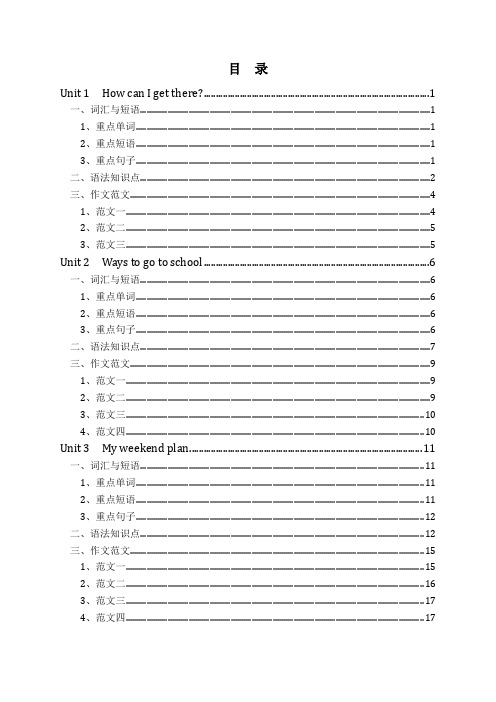
目录Unit 1 How can I get there? (1)一、词汇与短语 (1)1、重点单词 (1)2、重点短语 (1)3、重点句子 (1)二、语法知识点 (2)三、作文范文 (4)1、范文一 (4)2、范文二 (5)3、范文三 (5)Unit 2 Ways to go to school (6)一、词汇与短语 (6)1、重点单词 (6)2、重点短语 (6)3、重点句子 (6)二、语法知识点 (7)三、作文范文 (9)1、范文一 (9)2、范文二 (9)3、范文三 (10)4、范文四 (10)Unit 3 My weekend plan (11)一、词汇与短语 (11)1、重点单词 (11)2、重点短语 (11)3、重点句子 (12)二、语法知识点 (12)三、作文范文 (15)1、范文一 (15)2、范文二 (16)3、范文三 (17)4、范文四 (17)Unit 4 I have a pen pal (18)一、词汇与短语 (18)1、重点单词 (18)2、重点短语 (18)3、重点句子 (18)二、语法知识点 (19)三、作文范文 (23)1、范文一 (24)2、范文二 (24)3、范文三 (25)4、范文四 (25)Unit 5 What does he do (27)一、词汇与短语 (27)1、重点单词 (27)2、重点短语 (27)3、重点句子 (27)二、语法知识点 (28)三、作文范文 (30)1、范文一 (30)2、范文二 (31)3、范文三 (31)Unit 6 How do you feel (32)一、词汇与短语 (32)1、重点单词 (32)2、重点短语 (32)3、重点句子 (32)二、语法知识点 (33)三、作文范文 (34)1、范文一 (35)2、范文二 (35)3、范文三 (35)4、范文四 (35)语法知识点 (37)肯定句如何变否定句 (37)肯定句如何变一般疑问句 (39)划线部分提问(如何变特殊疑问句) (41)写作训练 (43)写作训练答案 (47)Unit 1 How can I get there?一、词汇与短语1、重点单词1.science /ˈsaɪəns/ 科学2.museum /mjuˈziːəm/ 博物馆3.post office /ˈpəʊst ɒfɪs/ 邮局4.bookstore /ˈbʊkstɔː/ 书店5.cinema /ˈsɪnəmə/ 电影院6.hospital /ˈhɒspɪtl/ 医院7.crossing /ˈkrɒsɪŋ/ 十字路口8.turn /tɜːn/ 转湾9.left /left/ 左10.right /raɪt/ 右11.straight /streɪt/ 笔直地12.ask /ɑːsk/ 问13.sir /sɜː(r)/ (对男子的礼貌称呼)先生14.interesting /ˈɪntrəstɪŋ/ 有趣的15.Italian /ɪˈtæliən/ 意大利的16.restaurant /ˈrestrɒnt/ 餐馆17.pizza /ˈpiːtsə/ 比萨饼18.street /striːt]/ 大街;街道19.get /get/ 到达20.gave /ɡeɪv/( give/ɡɪv/的过去式) 给21.follow /ˈfɒləʊ/ 跟着22.tell /tel/ 告诉2、重点短语1.science museum 科学博物馆2.near the library 图书馆附近3.get there 到达那里4.go straight 直走5.turn left/right 向左转/右转6.over there 在那边7.next to the museum 在博物馆旁边8.pet hospital 宠物医院9.Palace museum 故宫博物院10.in front of 在…前面11.behind the post office 在邮局后面12.beside the park 在公园旁边13.be far from 离……很远14.be far from home 远离家乡3、重点句子1. --Where is the museum shop?博物馆商店在哪里--It's near the door. 它在门附近。
人教精通版6年级上下册重点单词和句型默写
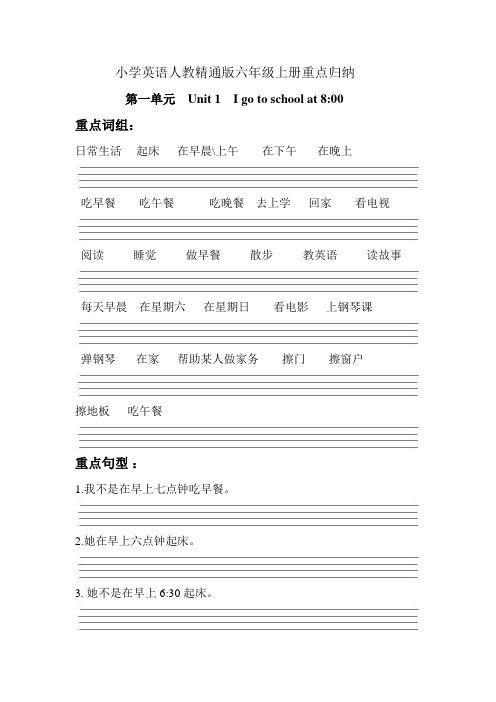
小学英语人教精通版六年级上册重点归纳第一单元Unit 1 I go to school at 8:00重点词组:日常生活起床在早晨\上午在下午在晚上吃早餐吃午餐吃晚餐去上学回家看电视阅读睡觉做早餐散步教英语读故事每天早晨在星期六在星期日看电影上钢琴课弹钢琴在家帮助某人做家务擦门擦窗户擦地板吃午餐重点句型:1.我不是在早上七点钟吃早餐。
2.她在早上六点钟起床。
3. 她不是在早上6:30起床。
4.凯特在周六做什么?5. 她通常弹钢琴。
6.我在7:30吃早饭。
7.我在12:00吃午饭。
8.我在6:00吃晚餐。
9.你在周六干什么?10.我经常去看电影。
第二单元Unit 2 What's your hobby? 重点词组:1. 一辆新的玩具汽车2. 看一看3. 收集玩具汽车4. 收集邮票5.收集地图6. 收集卡片7. 看8. 种花9. 喝中国茶10. 去钓鱼11. 做饭12. 对……感兴趣13. 做布娃娃14. 玩电脑游戏15. 照相16.照顾好17. 谈论18.打篮球19. 寻找20. 在冬天21. 从……到……22. 在夜间23. 在世界上重点句型:1. 你爷爷的爱好是什么?2. 他的爱好是钓鱼。
3. 你对什么感兴趣?4.我对拍照感兴趣。
5. 你的爱好是什么?6. 我的爱好是收集地图。
6. 你爸爸的爱好是什么?7. 他的爱好是种花。
第三单元Unit 3 Would you like to come to my birthday party?重点词组:生日聚会放学后邀请卡邀请朋友参加聚会与朋友庆祝生日向朋友赠送生日贺卡星形蛋糕心形蛋糕水果派\水果馅饼点蜡烛唱生日歌许愿吹蜡烛切蛋糕吃蛋糕一块蛋糕重点句型:1. 你想要什么种类的蛋糕?2.我想要一个心形的蛋糕。
3. 他们怎么庆祝生日的?4. 首先,他们点燃蜡烛,然后……5.你愿意来我的生日晚会吗?6. 当然,我愿意。
7. 再见。
8.我能吃些冰激凌吗?9. 这个生日蛋糕师送给你的。
人教版小学英语六年级上册单元重点
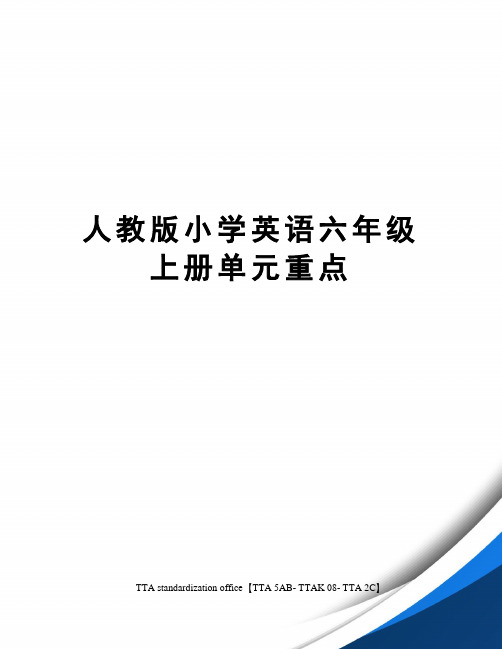
人教版小学英语六年级上册单元重点TTA standardization office【TTA 5AB- TTAK 08- TTA 2C】六年级上册1-3单元知识点Unit1 How Do You Go There (你怎样去那里)重点单词:on foot= walk走路 by bike骑自行车 by bus坐公车 by train坐火车 by plane坐飞机by ship坐轮船 by subway坐地铁 near近的 far远的 usually通常 sometimes有时候easy简单的 the fifth floor第五层楼 traffic lights交通灯 traffic rules交通规则 stop停止 wait等待 get to到达 same相同的 mean意思是 driver司机 right右边 left左边must必须 know知道重点句子:1. How do you go to school 你是怎样去上学的2. I go to school by bus.我是坐公交车去上学的。
3. Usually I go to school on foot. 我通常走路去上学。
4. Sometimes I go by bike. 有时候我骑自行车去。
、5. My home is near/ far. 我的家是近的。
/ 远的。
6. Look at the traffic lights, remember the traffic rules. 看着交通灯,记住交通规则。
7. Stop at a red light. Wait at a yellow light. Go at a green light. 红灯停。
黄灯等一等。
绿灯行。
8. Red means stop, yellow means wait, green means go. 红色的意思是停止,黄色的意思是等待,绿色的意思是通行。
9. How can I get to the park 我该怎样到达公园呢10. You can go by the No. 15 bus. 你可以坐15路公交车去。
人教精通版小学英语六年级上册unit1课文单词音频+知识点梳理+单元练习

人教精通版小学英语六年级上册unit1课文单词音频+知识点梳理+单元练习【预习必备】人教精通版小学英语六年级上册Unit1课文单词音频+知识点梳理+单元练习▲点右上方绿标即可收听Lesson 1 00:00--01:26Lesson 2 01:26--03:09Lesson 3 03:09--04:20Lesson 4 04:20--05:32Lesson 5 05:32--06:23Lesson 6 06:23--12:46Lesson 1Just read and talk情景详解:露西给李妍发送一封电子邮件,她向李妍详细介绍了她的日常生活和学习情况,她希望李妍给她回复一封电子邮件。
Dear Li Yan,亲爱的李妍My name is Lucy White.我叫露西·怀特I m from London. I m twelve. I m in Primary Six.我来自伦敦我十二岁我上小学六年级Now let me tell you about my daily life.现在我来告诉你你一些我的日常生活I get up at 7:30 in the morning.我早上七点半起床I have breakfast at 8:00.我八点吃早餐I go to school at 8:30.我八点半上学School begins at 9:00.我九点钟开始上课We have seven subjects.我们有七门课程They are English, maths, Chinese, science, PE, art and music.分别是英语数学中文科学体育艺术音乐I have lunch at school at 11:45.我十一点四十五在学校吃午餐School is over at 3:30 in the afternoon. I go home at 4:00.我下午三点半放学我四点回家I have dinner at about 7:00 in the evening.我晚上七点吃晚餐After dinner, I watch TV for 30 minutes and do some reading.晚餐之后我看三十分钟电视看会儿书I go to bed at about 9:30.我晚上九点半上床睡觉How about you and your family?你和你的家人呢Can you tell me by email?你能写邮件告诉我吗Best wishes,最好的祝福送给你Lucy露西Lesson 2I have breakfast at 7:30 in the morning.我在早晨七点半吃早餐。
人教版小学英语六年级上册知识清单全完整版
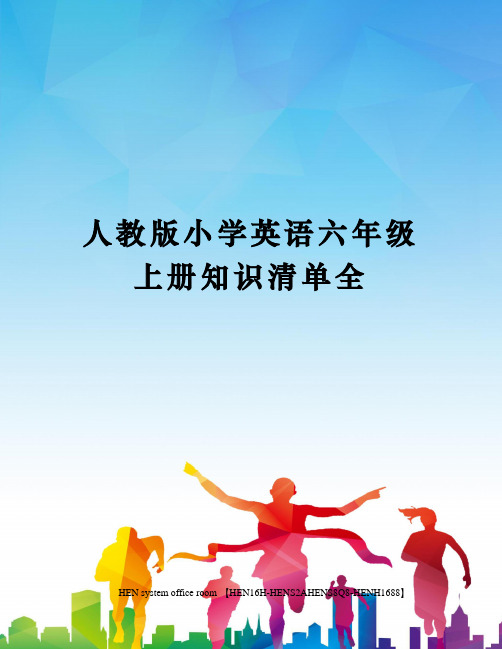
人教版小学英语六年级上册知识清单全HEN system office room 【HEN16H-HENS2AHENS8Q8-HENH1688】小学英语六年级(上)单元必备知识清单Unit1 How Do You Go There?一、重点单词及短语:by经......,乘...... / foot脚(复数feet)/bike自行车/ bus公共汽车/train火车/plane飞机/ship轮船/subway地铁/how怎样,如何/go to school去上学/then然后/traffic交通/traffic light交通灯/traffic rule交通规则/stop停/wait等/get to到达/country国家(复:countries)drive驾驶/England英国/Australia澳大利亚/if如果/must必须/know知道※频度副词:always总是(100%)>usually通常(80%)>often通常(60%)>sometimes 有时候(40%)>hardly ever几乎不(20%)>never决不,从不(0%)※同音异义词:经......,乘....../ buy购买/bye再见知道/no不※反义词:different不同的—same相同的right右边的—left左边的二、重点句型:1、How do you go to school,Sarah?你怎么去上学,萨拉?2、Usually I go to school on foot.=I usually go to school on foot.我通常走路去上学。
3、Sometimes I go(to school) by bike.=I sometimes go (to school)by bike.有时候我骑自行车去。
4、Stop at a red light.红灯停。
Wait at a yellow light.黄灯等。
完整版)小学英语人教精通版六年级上册重点归纳
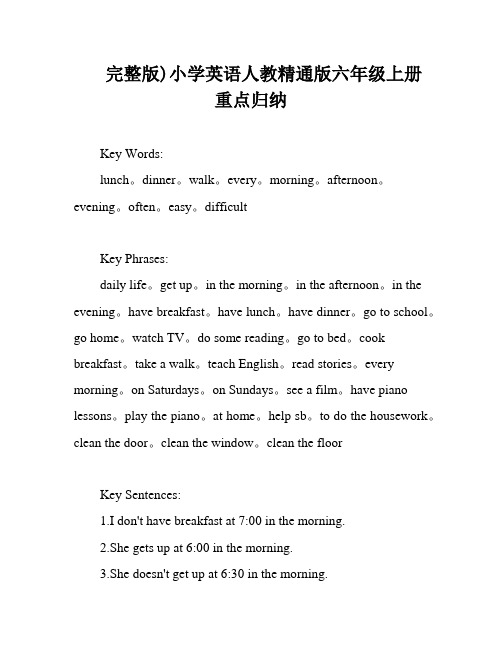
完整版)小学英语人教精通版六年级上册重点归纳Key Words:lunch。
dinner。
walk。
every。
morning。
afternoon。
evening。
often。
easy。
difficultKey Phrases:daily life。
get up。
in the morning。
in the afternoon。
in the evening。
have breakfast。
have lunch。
have dinner。
go to school。
go home。
watch TV。
do some reading。
go to bed。
cook breakfast。
take a walk。
teach English。
read stories。
every morning。
on Saturdays。
on Sundays。
see a film。
have piano lessons。
play the piano。
at home。
help sb。
to do the housework。
clean the door。
clean the window。
clean the floorKey Sentences:1.I don't have breakfast at 7:00 in the morning.2.She gets up at 6:00 in the morning.3.She doesn't get up at 6:30 in the morning.4.What does Kate do on Saturdays?5.She usually plays the piano.6.I have breakfast at 7:30.In daily life。
we have three meals a day: lunch。
dinner。
and breakfast。
We often walk to school。
小学英语人教精通版六年级上册重点归纳

小学英语人教精通版六年级上册重点归纳第一单元Unit 1 重点单词:lunch 午餐every 每一个evening 晚上difficult困难重点词组:1. daily life 日常生活3. in the morning 在早晨上午5. in the evening 在晚上7. have lunch 吃午餐walk 走;步行afternoon 下午easy容易2. get up 起床4. in the afternoon 在下午6. have breakfast 吃早餐8. have dinner 吃晚餐10. go home 回家12. do some reading 阅读14. cook breakfast 做早餐16. teach English 教英语18. every morning 每天早晨20. on Sundays 在星期日22. have Pia no IeSS OnS 上钢琴课24. at home 在家25. help sb. to do the housework帮助某人做家务26. clea n the door扌察门27. clean the window 擦窗户I go to school at 8:00dinner 晚餐morning 早上often时常;常常9. go to school 去上学11. watch TV 看电视13. go to bed 睡觉15. take a walk 散步17. read stories 读故事19. on Saturdays 在星期六21. see a film 看电影23. play the piano 弹钢琴28. clean the floor 擦地板重点句型:1.I don'h t ave breakfast at 7:00 in the morning .我不是在早上七点钟吃早餐。
2.She gets up at 6:00 in the morning 她. 在早上六点钟起床。
人教精通版小学英语六年级上册重点归纳
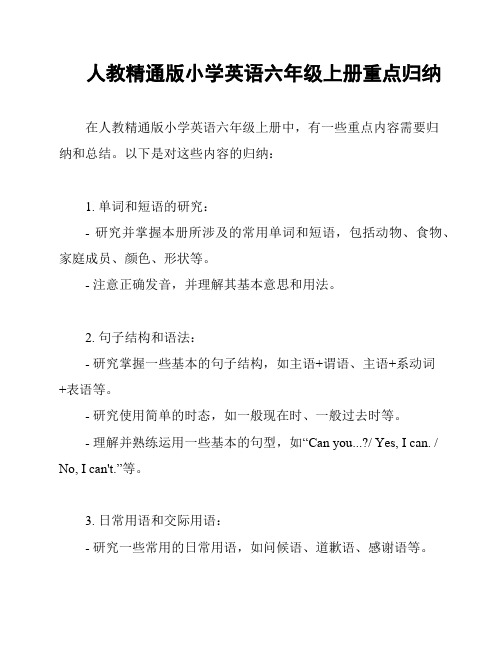
人教精通版小学英语六年级上册重点归纳
在人教精通版小学英语六年级上册中,有一些重点内容需要归
纳和总结。
以下是对这些内容的归纳:
1. 单词和短语的研究:
- 研究并掌握本册所涉及的常用单词和短语,包括动物、食物、家庭成员、颜色、形状等。
- 注意正确发音,并理解其基本意思和用法。
2. 句子结构和语法:
- 研究掌握一些基本的句子结构,如主语+谓语、主语+系动词
+表语等。
- 研究使用简单的时态,如一般现在时、一般过去时等。
- 理解并熟练运用一些基本的句型,如“Can you...?/ Yes, I can. / No, I can't.”等。
3. 日常用语和交际用语:
- 研究一些常用的日常用语,如问候语、道歉语、感谢语等。
- 研究并练简单的交际用语,如问答基本信息、提出请求、表达意见等。
4. 阅读理解:
- 阅读短文或简单的对话,理解其中的基本内容和信息。
- 掌握提取关键信息的技巧,如找出主题句、主要人物等。
5. 听力训练:
- 听取简短的对话或句子,理解其基本意思。
- 提高听力技巧,包括听清语音、辨别关键词等。
6. 书写和拼写:
- 研究正确书写和拼写常见的单词和短语。
- 注意字母大小写和书写规范。
以上是人教精通版小学英语六年级上册的重点归纳。
通过研究这些内容,可以提高英语听、说、读、写的能力,为接下来的研究打下基础。
> *注意:上述内容为总结归纳,具体细节和例句可详细阅读教材内容。
*。
人教版人教版小学英语六年级上册知识点归纳图文稿
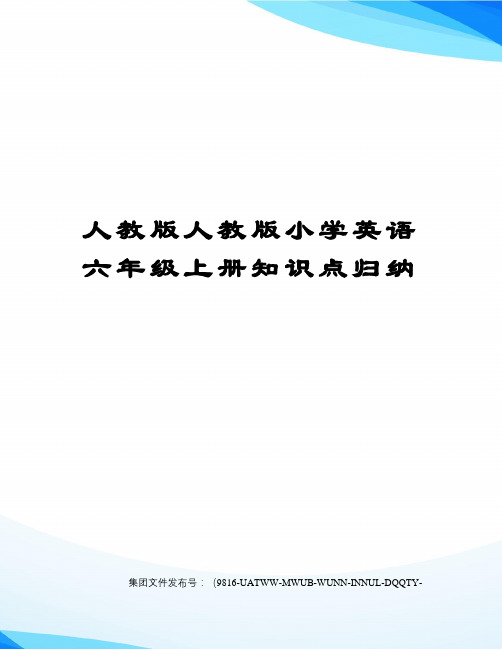
人教版人教版小学英语六年级上册知识点归纳集团文件发布号:(9816-UATWW-MWUB-WUNN-INNUL-DQQTY-人教版(PEP)小学英语总复习六年级上册知识点Unit1Howcan I get there一、主要单词:museum博物馆 bookstore书店 cinema电影院 turn 转弯 hospital医院 left向左 post office 邮局 science科学right向右straight笔直地 crossing十字路口二、习惯语搭配:post office邮局 science museum科学博物馆 pet hospital宠物医院Italian restaurant意大利餐馆 Beihai Park北海公园 Palace Museum 故宫博物院 go straight直走 turn right/left右/左转 next to挨着in front of...在...前面 near the park在公园附近 on Dongfang Street在东方大街上三、惯用表达式:Excuse me 打扰一下 Follow me, please!请跟着我!四、公式化句型:1、问路的句型及其答语:问句:Where is the + 地点?···在哪儿?答语:It’s + 表示地点的词语。
它···。
2、询问怎么到某地的句型及其答语:问句:How can +主语 + get (to)+地点···怎么到···同义句型:Can you tell me the way to +地点Where is + 地点Which isthe way to +地点答语:Turn +方向+表示地点的介词短语。
···转。
五、例句:Whereisthecinema,please请问电影院在哪里?It’snexttothehospital. 它与医院相邻。
人教版六年级英语上册全册重点句型复习
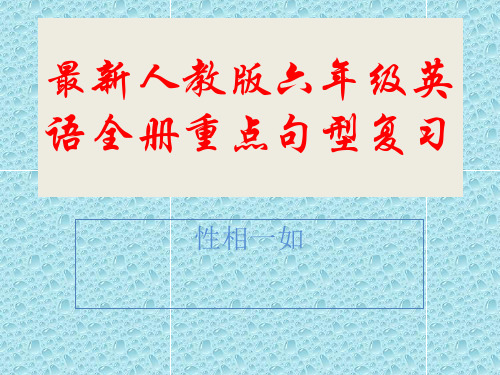
性相一如
1、Where Is the hospital? It’s in front of the cinema.
问路句型
Where is +地点? It’s +表示位置的短语。
2、How can we get there? Turn left at the bookstore.
• Hobbies, are, what, your(?) • What are your hobbies? • Like,she,dancing,does(?) • Does she like dancing? • Live, I, in, Changsha(.) • I live in Changsha. • I,like, reading, stories,also(.) • I also like reading stories.
2、以不发音的字母e结尾,去e加ing • 如make---making,write---writing • 末尾只有一个辅音字母的重读闭音节,双写末
尾辅音字母,再加ing,如stop—stopping, begin--beginning
Does he live in Sydney? No,he doesn’t.
做什么的?
Where does he work? He works at sea .
询问他人的工作地点 Where does +主语(第三人称单数)+work? He/She works +表示地点的介词短语 询问他人上班方式句型及答语 How does +主语(第三人称单数 )+go to work? He/She goes to work +出行方式(by bike , on foot , by bus …)
小学六年级英语(上册)知识归纳|人教版 笔记 重点
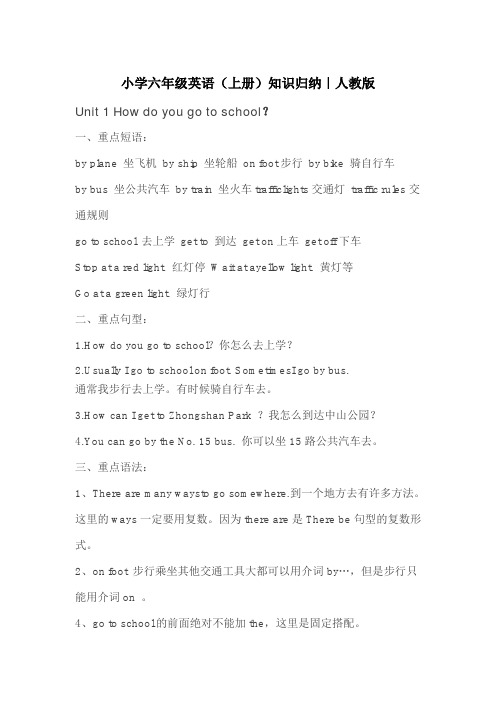
小学六年级英语(上册)知识归纳|人教版Unit 1 How do you go to school?一、重点短语:by plane 坐飞机by ship 坐轮船on foot步行by bike 骑自行车by bus 坐公共汽车by train 坐火车trafficlights交通灯traffic rules交通规则go to school 去上学get to 到达get on上车get off下车Stop at a red light. 红灯停Wait at ayellow light. 黄灯等Go at a green light. 绿灯行二、重点句型:1.How do you go to school?你怎么去上学?ually I go to school on foot. SometimesI go by bus.通常我步行去上学。
有时候骑自行车去。
3.How can I get to Zhongshan Park ?我怎么到达中山公园?4.You can go by the No. 15 bus. 你可以坐15路公共汽车去。
三、重点语法:1、There are many waysto go somewhere.到一个地方去有许多方法。
这里的ways一定要用复数。
因为there are是There be句型的复数形式。
2、on foot 步行乘坐其他交通工具大都可以用介词by…,但是步行只能用介词on 。
4、go to school的前面绝对不能加the,这里是固定搭配。
5、USA 和US 都是美国的意思。
另外America也是美国的意思。
6、go to the park 前面一定要加the. 如果要去的地方有具体的名字,就不能再加the ,如果要去的地方没有具体名字,都要在前面加the. (go to school除外。
)7、How do you go to …?你怎样到达某个地方?如果要问的是第三人称单数,则要用:How does he/she…go to …?8、反义词:get on(上车)---get off(下车)near(近的)—far(远的)fast(快的)—slow(慢的)because(因为)—why(为什么)same(相同的)—different(不同的)9、近义词:see you---goodbye sure---certainly---ofcourse10、频度副词:always 总是,一直usually 通常often经常sometimes 有时候never 从来不Unit 2 Where is the science museum?一、重点短语:library 图书馆post office 邮局hospital医院cinema 电影院bookstore书店science museum科学博物馆turnleft向左转turn right 向右转go straight 直行north北south南east东west西next to靠近、与……。
人教版小学六年级上册英语知识点【各单元】
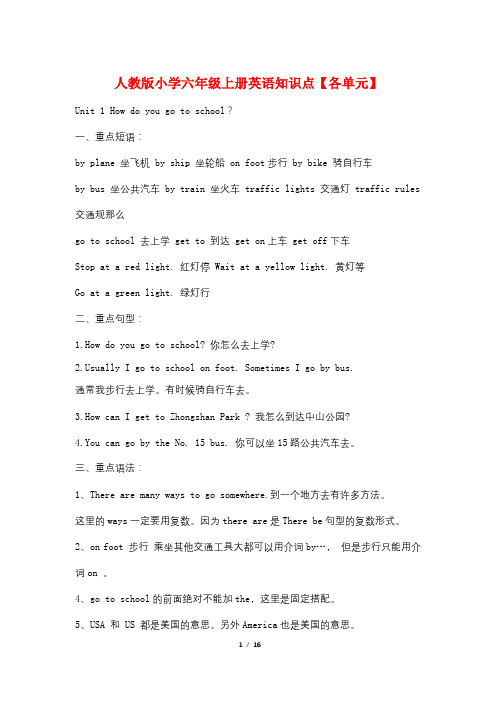
人教版小学六年级上册英语知识点【各单元】Unit 1 How do you go to school?一、重点短语:by plane 坐飞机 by ship 坐轮船 on foot步行 by bike 骑自行车by bus 坐公共汽车 by train 坐火车 traffic lights 交通灯 traffic rules 交通规那么go to school 去上学 get to 到达 get on上车 get off下车Stop at a red light. 红灯停 Wait at a yellow light. 黄灯等Go at a green light. 绿灯行二、重点句型:1.How do you go to school? 你怎么去上学?ually I go to school on foot. Sometimes I go by bus.通常我步行去上学。
有时候骑自行车去。
3.How can I get to Zhongshan Park ? 我怎么到达中山公园?4.You can go by the No. 15 bus. 你可以坐15路公共汽车去。
三、重点语法:1、There are many ways to go somewhere.到一个地方去有许多方法。
这里的ways一定要用复数。
因为there are是There be句型的复数形式。
2、on foot 步行乘坐其他交通工具大都可以用介词by…,但是步行只能用介词on 。
4、go to school的前面绝对不能加the,这里是固定搭配。
5、USA 和 US 都是美国的意思。
另外America也是美国的意思。
6、go to the park 前面一定要加the. 如果要去的地方有具体的名字,就不能再加the ,如果要去的地方没有具体名字,都要在前面加the. ( go to school 除外。
)7、How do you go to …?你怎样到达某个地方?如果要问的是第三人称单数,那么要用:How does he/she…go to …?8、反义词:get on(上车)---get off(下车) near(近的)—far(远的) fast(快的)—slow(慢的)because(因为)—why(为什么) same(相同的)—different(不同的)9、近义词:see you---goodbye sure---certainly---of course10、频度副词:always 总是,一直 usually 通常 often经常 sometimes 有时候 never 从来不针对练习I.中英互译:boat_________ taxi_______ motorbike _______ bus _______地铁轮船飞机火车附近走路骑单车上学because_______ by car _______ sometimes________ often________II.用in,on,under,by,near填空。
六年级上册英语人教精通版知识要点
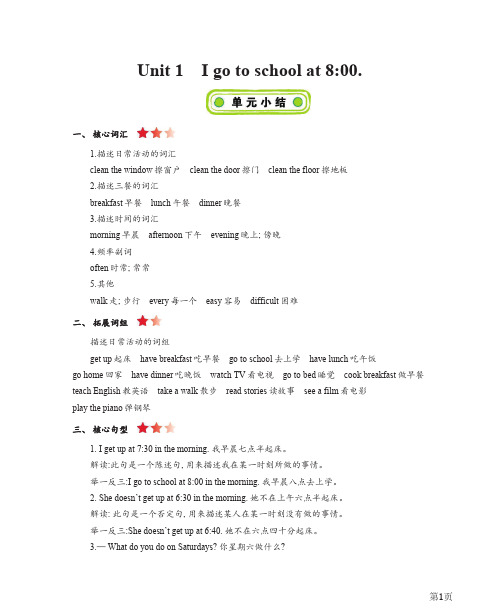
Unit1I go to school at8:00.一、核心词汇1.描述日常活动的词汇clean the window擦窗户clean the door擦门clean the floor擦地板2.描述三餐的词汇breakfast早餐lunch午餐dinner晚餐3.描述时间的词汇morning早晨afternoon下午evening晚上;傍晚4.频率副词often时常;常常5.其他walk走;步行every每一个easy容易difficult困难二、拓展词组描述日常活动的词组get up起床have breakfast吃早餐go to school去上学have lunch吃午饭go home回家have dinner吃晚饭watch TV看电视go to bed睡觉cook breakfast做早餐teach English教英语take a walk散步read stories读故事see a film看电影play the piano弹钢琴三、核心句型1.I get up at7:30in the morning.我早晨七点半起床。
解读:此句是一个陈述句,用来描述我在某一时刻所做的事情。
举一反三:I go to school at8:00in the morning.我早晨八点去上学。
2.She doesn’t get up at6:30in the morning.她不在上午六点半起床。
解读:此句是一个否定句,用来描述某人在某一时刻没有做的事情。
举一反三:She doesn’t get up at6:40.她不在六点四十分起床。
3.—What do you do on Saturdays?你星期六做什么?00—I often go and see a film with my parents.我经常和我的父母一起去看电影。
解读:这是用来询问对方某天做什么及其回答的句子。
举一反三:—What do you do on the weekend?你周末做什么?—I often do homework.我经常做作业。
人教版小学六年级英语(上册)知识归纳
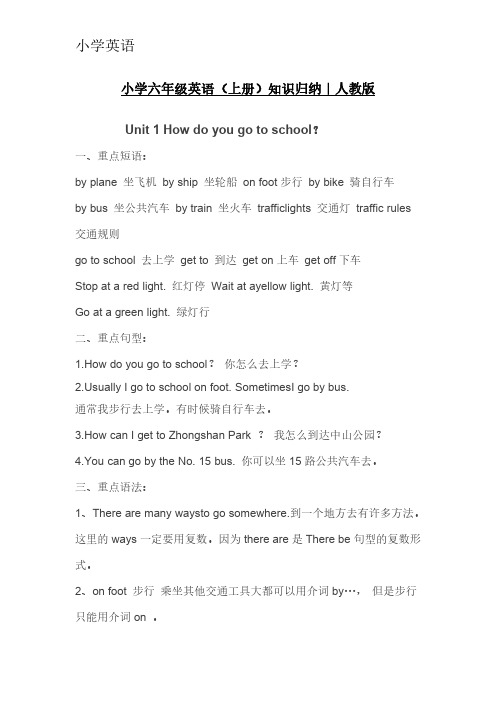
小学六年级英语(上册)知识归纳|人教版Unit1How do you go to school?一、重点短语:by plane坐飞机by ship坐轮船on foot步行by bike骑自行车by bus坐公共汽车by train坐火车trafficlights交通灯traffic rules交通规则go to school去上学get to到达get on上车get off下车Stop at a red light.红灯停Wait at ayellow light.黄灯等Go at a green light.绿灯行二、重点句型:1.How do you go to school?你怎么去上学?ually I go to school on foot.SometimesI go by bus.通常我步行去上学。
有时候骑自行车去。
3.How can I get to Zhongshan Park?我怎么到达中山公园?4.You can go by the No.15bus.你可以坐15路公共汽车去。
三、重点语法:1、There are many waysto go somewhere.到一个地方去有许多方法。
这里的ways一定要用复数。
因为there are是There be句型的复数形式。
2、on foot步行乘坐其他交通工具大都可以用介词by…,但是步行只能用介词on。
4、go to school的前面绝对不能加the,这里是固定搭配。
5、USA和US都是美国的意思。
另外America也是美国的意思。
6、go to the park前面一定要加the.如果要去的地方有具体的名字,就不能再加the,如果要去的地方没有具体名字,都要在前面加the.(go to school除外。
)7、How do you go to…?你怎样到达某个地方?如果要问的是第三人称单数,则要用:How does he/she…go to…?8、反义词:get on(上车)---get off(下车)near(近的)—far(远的)fast(快的)—slow(慢的)because(因为)—why(为什么)same(相同的)—different(不同的)9、近义词:see you---goodbye sure---certainly---ofcourse10、频度副词:always总是,一直usually通常often经常sometimes有时候never从来不Unit2Where is the science museum?一、重点短语:library图书馆post office邮局hospital医院cinema电影院bookstore书店science museum科学博物馆turnleft向左转turn right向右转go straight直行north北south南east东west西next to靠近、与……。
人教版六年级上册英语重点知识点归纳
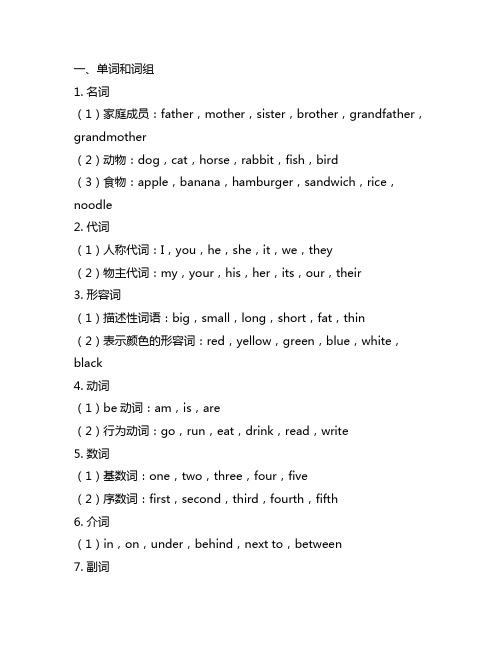
一、单词和词组1. 名词(1)家庭成员:father,mother,sister,brother,grandfather,grandmother(2)动物:dog,cat,horse,rabbit,fish,bird(3)食物:apple,banana,hamburger,sandwich,rice,noodle2. 代词(1)人称代词:I,you,he,she,it,we,they(2)物主代词:my,your,his,her,its,our,their3. 形容词(1)描述性词语:big,small,long,short,fat,thin(2)表示颜色的形容词:red,yellow,green,blue,white,black4. 动词(1)be动词:am,is,are(2)行为动词:go,run,eat,drink,read,write5. 数词(1)基数词:one,two,three,four,five(2)序数词:first,second,third,fourth,fifth6. 介词(1)in,on,under,behind,next to,between7. 副词(1)频度副词:always,usually,sometimes,never (2)程度副词:very,quite,too8. 连词(1)and,but,because9. 情态动词(1)can,could,may,might二、语法1. 一般现在时(1)肯定句形式:主语+动词原形+其他(2)否定句形式:主语+be动词+not+动词原形+其他(3)疑问句形式:Be动词+主语+动词原形+其他?2. 物主代词(1)第一人称单数:my(2)第二人称单数:your(3)第三人称单数:his,her,its(4)第一人称复数:our(5)第二人称复数:your(6)第三人称复数:their3. be动词(1)肯定句形式:主语+be动词+其他(2)否定句形式:主语+be动词+not+其他(3)疑问句形式:Be动词+主语+其他?4. 数词(1)基数词用法:表示数量,如one,two,three (2)序数词用法:表示顺序,如first,second,third 5. 介词短语(1)in/on/under+名词:表示位置(2)behind/next to/between+名词:表示位置关系三、对话1. 问候与介绍(1)Hello,I’m…(2)What’s your name?(3)How are you?2. 家庭成员介绍(1)This is my father/mother/sister/brother. (2)Is she your mother?(3)Yes, she is.3. 动物和食物(1)Do you have a pet?(2)Yes, I have a cat/dog/…(3)What’s your f avorite food?(4)My favorite food is…四、阅读1. 短文阅读Mary is a girl. She has a big family. She has a father, a mother, a sister and a brother. They have a dog and a cat. Mary’s favorite food is hamburger. She likes playing with her pets.2. 阅读理解(1)根据短文内容判断正误。
六年级上册人教精通版
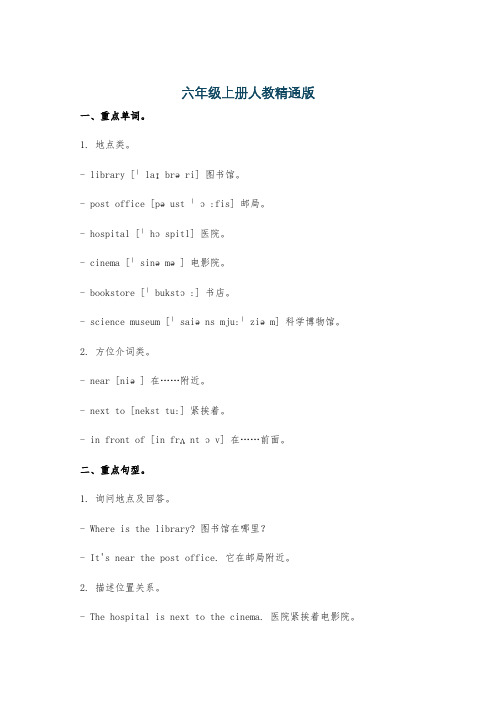
六年级上册人教精通版一、重点单词。
1. 地点类。
- library [ˈlaɪbrəri] 图书馆。
- post office [pəust ˈɔ:fis] 邮局。
- hospital [ˈhɔspitl] 医院。
- cinema [ˈsinəmə] 电影院。
- bookstore [ˈbukstɔ:] 书店。
- science museum [ˈsaiəns mju:ˈziəm] 科学博物馆。
2. 方位介词类。
- near [niə] 在……附近。
- next to [nekst tu:] 紧挨着。
- in front of [in frʌnt ɔv] 在……前面。
二、重点句型。
1. 询问地点及回答。
- Where is the library? 图书馆在哪里?- It's near the post office. 它在邮局附近。
2. 描述位置关系。
- The hospital is next to the cinema. 医院紧挨着电影院。
- There is a bookstore in front of the science museum. 在科学博物馆前面有一个书店。
三、语法点。
1. there be句型。
- 概念:表示“某地有某物”。
- 结构:There is + 单数可数名词/不可数名词+地点状语.- 例如:There is a park in my neighborhood.- There are+复数可数名词+地点状语.- 例如:There are some trees in the park.- 就近原则:当有多个并列主语时,be动词的形式取决于离它最近的主语的单复数形式。
- 例如:There is a book and two pens on the desk.(离be动词最近的是a book,为单数,所以用is)- There are two pens and a book on the desk.(离be动词最近的是two pens,为复数,所以用are)2. 方位介词的用法。
人教版小学六年级英语上册知识点总结和复习要点
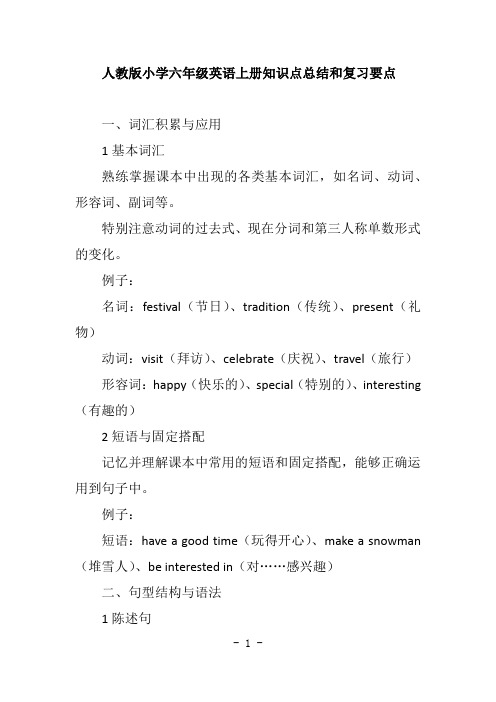
人教版小学六年级英语上册知识点总结和复习要点一、词汇积累与应用1基本词汇熟练掌握课本中出现的各类基本词汇,如名词、动词、形容词、副词等。
特别注意动词的过去式、现在分词和第三人称单数形式的变化。
例子:名词:festival(节日)、tradition(传统)、present(礼物)动词:visit(拜访)、celebrate(庆祝)、travel(旅行)形容词:happy(快乐的)、special(特别的)、interesting (有趣的)2短语与固定搭配记忆并理解课本中常用的短语和固定搭配,能够正确运用到句子中。
例子:短语:have a good time(玩得开心)、make a snowman (堆雪人)、be interested in(对……感兴趣)二、句型结构与语法1陈述句复习并巩固陈述句的基本结构,能够正确构建和表达完整的句子。
例子:陈述句:I like playing football in the afternoon.(我喜欢下午踢足球。
)2疑问句学习和掌握特殊疑问句、一般疑问句及其回答方式,能够准确理解并回答问题。
例子:特殊疑问句:What do you usually do on your birthday?(你生日通常做什么?)回答:I usually have a birthday party with my friends.(我通常和朋友们一起举办生日派对。
)3祈使句巩固祈使句的基本用法,能够正确使用祈使句表达请求、命令或建议。
例子:祈使句:Please don’t forget to bring your homework tomorrow.(请别忘了明天带作业来。
)4时态复习并巩固一般现在时、一般过去时、一般将来时和现在进行时等时态的基本用法和形式。
例子:一般现在时:She often reads books after dinner.(她晚饭后经常看书。
)一般过去时:We went to the zoo last weekend and saw many animals.(我们上周末去了动物园,看到了很多动物。
小学人教版六年级英语上册复习要点

小学人教版六年级英语上(Shang)册复习要点Unit1 How can I get there?一(Yi)、重点单词:地(Di)点:science museum科学(Xue)博物馆 post office 邮局 bookstore 书店cinema 电影院 hospital 医院动(Dong)作:go straight 直(Zhi)走 turn left/right 左转、右转方(Fang)位: in front of :在(Zai)···前面 behind 在···后面near在…旁边 next to 紧挨着 beside 在旁边over 在…上方 on the left 在左边 on the right 在右边二、重点句型:(1)Is / Are there…?某处有某物吗?肯定回答:Yes, there is/are. 否定回答:No, there isn’t/aren’t.(2)Where is the + 地点? ... ... 在哪里?It’s + 表示地点的名词. 它... ...例句:Where is the cinema? 电影院在哪?It’s next to the bookstore. 在书店的旁边。
(3)How can + 主语+get(to)+ 地点? ... ...怎么到... ...?(如果get后面接的词为副词,则要省略介词to.)例句:How can we get to the park?How can we get there? 我们怎么到那儿?同义句型:Can you tell me the way to + 地点?( 4 )Where is + 地点? Which is the way to + 地点?( 5 ) Turn left at the bookstore. 到书店左转。
Unit 2 Ways to go to school?一、重点单词/短语:交通方式:by bike /bus /plane /subway /train /ship /taxi /ferry骑自行车/乘公共汽车/飞机/地铁/火车/船/出租汽车/轮渡take the No.57 bus 乘57路公共汽车on foot 步行其他:slow down慢下来 pay attention to 注意 traffic lights 交通信号灯 look right 向右看 cross the road 横穿马路 at home 在家二、重点句型:(1)How do you + 地点?你们怎么来... 的?I usually/ often/sometimes .. ... 我通常/经常/有时...How do you go(to) + 地点?你们怎么去...的?How do you get (to) + 地点?你们怎(Zen)么到达...的?(频度副词:频度副词又称频率副词,用来表示事情发(Fa)生的频率,即某事多主语 + must + 动词原(Yuan)形 + (其它)(must和(He)can, should一样都是情态动(Dong)词,must意(Yi)思是“必(Bi)须”,语气很强烈,没有人称和数的变化,后面接动词原形。
人教版小学六年级上册英语知识点总结归纳
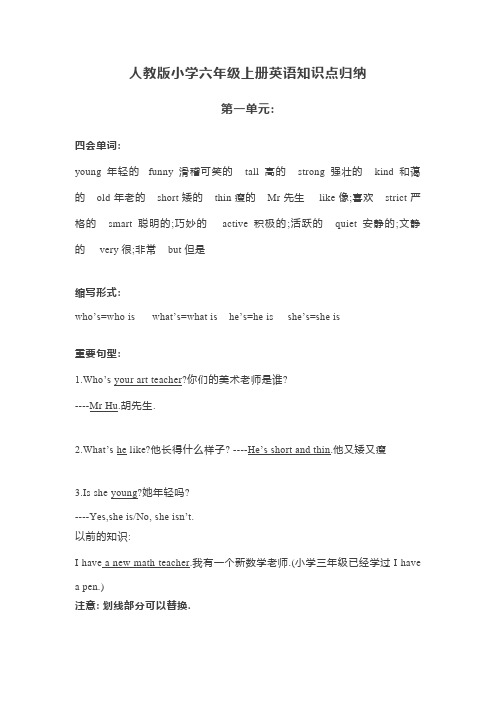
人教版小学六年级上册英语知识点归纳第一单元:四会单词:young年轻的funny滑稽可笑的tall高的strong强壮的kind和蔼的old年老的short矮的thin瘦的Mr先生like像;喜欢strict严格的smart聪明的;巧妙的active积极的;活跃的quiet安静的;文静的very很;非常but但是缩写形式:who’s=who is what’s=what is he’s=he is she’s=she is重要句型:1.Who’s your art teacher?你们的美术老师是谁?----Mr Hu.胡先生.2.What’s he like?他长得什么样子? ----He’s short and thin.他又矮又瘦3.Is she young?她年轻吗?----Yes,she is/No, she isn’t.以前的知识:I have a new math teacher.我有一个新数学老师.(小学三年级已经学过I havea pen.)注意: 划线部分可以替换.第二单元:四会单词:Monday 星期一 Tuesday星期二Wednesday星期三 Thursday星期四Friday 星期五Saturday星期六 Sunday 星期日day天;日子have有;吃on 在……时候too也;太短语:do homework 做作业watch TV 看电视read books 读书What about? ......怎么样?do housework 做家务play computer games 玩电脑游戏重点句型:1.What day is it today?今天星期几?—It’s Monday.星期一.2. What do we have on Mondays?星期一我们有什么课?—We have English,science,computer and P.E.我们有英语课,科学,计算机跟体育课.3.What do you do on Saturdays?星期六你干什么?(具体的某一天前用介词on,在具体的时间前,用介词at)—I often do my homework.我通常做家庭作业.4.What about you?你呢?—I do my homework,too.我也是做家庭作业.第三单元:四会单词:eggplant 茄子fish 鱼green beans 青豆tofu 豆腐potato 土豆tomato 西红柿for 为;给lunch 中餐;午饭we 我们tasty 好吃的;可口的sweet 甜的sour 酸的fresh 新鲜的salty 咸的favourite 最喜爱的;特别喜爱的fruit 水果grape 葡萄缩写形式:they’re=they are don’t=do not重点句型:1.What would you like for lunch?你午餐想吃什么?-----I’d like some tomatoes and mutton.我想吃一些西红柿跟羊肉.2.What’s your favourite fruit?你最喜欢的水果是什么?------/I like apples.我喜欢苹果.3.I don’t like grapes.我不喜欢葡萄.4.Bananas are my favourite.我最喜欢香蕉.第四单元一. 单词:empty the trash倒垃圾cook the meals 做饭water the flowers浇花sweep the floor扫地clean the bedroom打扫卧室make the bed铺床set the table摆餐具wash the clothes洗衣服do the dishes洗碗碟put away the clothes收拾衣服can’t = cannot(不会;不能)use a computer(使用计算机)二. 句子:1. I’m helpful!I can sweep the floor。
- 1、下载文档前请自行甄别文档内容的完整性,平台不提供额外的编辑、内容补充、找答案等附加服务。
- 2、"仅部分预览"的文档,不可在线预览部分如存在完整性等问题,可反馈申请退款(可完整预览的文档不适用该条件!)。
- 3、如文档侵犯您的权益,请联系客服反馈,我们会尽快为您处理(人工客服工作时间:9:00-18:30)。
小学英语人教精通版六年级上册重点归纳第一单元Unit 1 I go to school at 8:00重点词组:1. daily life 日常生活2. get up 起床3. in the morning 在早晨\上午4. in the afternoon 在下午5. in the evening 在晚上6. have breakfast 吃早餐7. have lunch 吃午餐8. have dinner 吃晚餐9. go to school 去上学10. go home 回家11. watch TV 看电视12. do some reading 阅读13. go to bed 睡觉14. cook breakfast 做早餐15. take a walk 散步16. teach English 教英语17. read stories 读故事18. every morning 每天早晨19. on Saturdays 在星期六20. on Sundays 在星期日21. see a film 看电影22. have piano lessons 上钢琴课23. play the piano 弹钢琴24. at home 在家25. help sb. to do the housework 帮助某人做家务26. clean the door 擦门27. clean the window 擦窗户28. clean the floor 擦地板29. eat lunch 吃午餐重点句型:1.I don’t have breakfast at 7:00 in the morning . 我不是在早上七点钟吃早餐。
2.She gets up at 6:00 in the morning . 她在早上六点钟起床。
3.She doesn’t get up at 6:30 in the morning . 她不是在早上6:30起床。
4.What does Kate do on Saturdays? 凯特在周六做什么?5.She usually plays the piano. 她通常弹钢琴。
6.I have breakfast at 7:30. 我在7:30吃早饭。
7.I have lunch at 12:00. 我在12:00吃午饭。
8.I have dinner at 6:00. 我在6:00吃晚餐。
9.What do you do on Saturdays? 你在周六干什么?10.I often go and see a film. 我经常去看电影。
第二单元Unit 2 What's your hobby?重点词组:1. a new toy car 一辆新的玩具汽车2. have a look 看一看3. collect toy cars 收集玩具汽车4. collect stamps 收集邮票5. collect maps收集地图6. collect picture cards 收集卡片7. look at 看8. plant flowers 种花9. drink Chinese tea 喝中国茶10. go fishing 去钓鱼11. cook meals 做饭12. be interested in…对……感兴趣13. make dolls 做布娃娃14. play computer games 玩电脑游戏15. take photos 照相16. take good care of 照顾好17. talk about 谈论 18. play basketball 打篮球19. look for 寻找20. in winter 在冬天21. from…to…从……到……22. at night 在夜间23. in the world 在世界上1. What’s your grandpa’s hobby? 你爷爷的爱好是什么?2. His hobby is fishing . 他的爱好是钓鱼。
3. What are you interested in? 你对什么感兴趣?4. I’m interested in taking photos. 我对拍照感兴趣。
5. What’s your hobby? 你的爱好是什么?6. My hobby is collecting maps. 我的爱好是收集地图。
6. What’s your dad’s hobby? 你爸爸的爱好是什么?7. His hobby is planting flowers . 他的爱好是种花。
第三单元Unit 3 Would you like to come to my birthday party?重点词组:1. birthday party 生日聚会2. after school 放学后3. invitation card 邀请卡4. invite your friends to your party 邀请朋友参加聚会5. celebrate your birthday with your friends 与朋友庆祝生日6. give a birthday card to your friend 向朋友赠送生日贺卡7. star-shaped cake 星形蛋糕 8. heart-shaped cake 心形蛋糕9. fruit pie 水果派\水果馅饼10. light the candles 点蜡烛11. sing the birthday song 唱生日歌12. make a wish 许愿13. blow out the candles 吹蜡烛14. cut the cake 切蛋糕15. eat the cake 吃蛋糕16. a piece of cake 一块蛋糕1. What kind of cake would you like? 你想要什么种类的蛋糕?2. I’d like a heart-shaped cake. 我想要一个心形的蛋糕。
3. How do they celebrate the birthday? 他们怎么庆祝生日的?4. First, they light the candles and then 首先,他们点燃蜡烛,然后……5. Would you like to come to my birthday party? 你愿意来我的生日晚会吗?6. Sure. I’d love to . 当然,我愿意。
7. Good bye!/Bye-bye!/Bye! 再见。
8. Can I have some ice cream ? 我能吃些冰激凌吗?9. Here’s a birthday cake for you . 这个生日蛋糕师送给你的。
10. invite your friends to your party 邀请你的朋友到你的晚会11. celebrate your birthday with your friends 和你的朋友一起庆祝你的生日12. give a birthday card to your friend 把这个生日卡片给你朋友第四单元Unit 4 January is the first month重点词组:1. the first month of the year 一年里的第一个月2. the second month of the year一年里的第二个月3. New Year’s Day 新年4. Spring Festival 春节5. Tree Planting Day 植树节6. Labor Day \May Day 劳动节7. Mother’s Day 母亲节8. Children’s Day 儿童节9. Father’s Day 父亲节10. plant trees 植树11. the third month of the year 一年里的第三个月12. the fourth month of the year 一年里的第四个月13. the fifth month of the year 一年里的第五个月14. the sixth month of the year 一年里的第六个月15. go back home 回家16. in the south of China 在中国南方17. all the day 一整天18. in March 在三月19. take a photo 照相20. go on a trip 旅行重点句型:1. January is the first month of the year. 一月份是一年中的第一个月。
2. February is the second month of the year. 二月份是一年中的第二个月。
3. March is the third month of the year . 三月份是一年中的第三个月。
4. April is the fourth month of the year. 四月份是一年中的第四个月。
5. May is the fifth month of the year . 五月份是一年中的第五个月。
6. June is the sixth month of the year . 六月份是一年中的第六个月。
第五单元Unit 5 July is the seventh month重点词组:1. the seventh month of the year 一年里的第七个月2. July 1st 七月一日3. the Communist Party of China 中国共产党4. Party members 党员5. the eighth month of the year一年里的第八个月6. Amy Day 建军节7. National Day 国庆节8. Teachers’ Day 教师节9. Thanksgiving Day 感恩节10. on August 1st 在八月一日11. in August 在八月12. summer holidays 暑假13. the party’s birthday 党的生日14. the ninth month of the year 一年里的第九个月15. go back to school 回到学校16. Santa Claus 圣诞老人17. the tenth month of the year 一年里的第十个月18. the eleventh month of the year一年里的第十一个月19. the twelfth month of the year 一年里的第十二个月重点句型:1. July is the seventh month of the year. 七月是一年中的第七个月。
